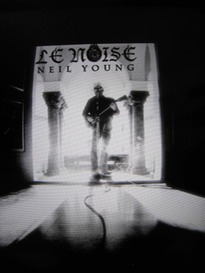A glance at Neil Young's recent discography would've had a betting man reaching for the wallet to back solo and/or acoustic as the most likely format for the next album, and the betting man would have been beaten a short half head by Le Noise.

After the power trio plus choir protest rock of Living With War, the mixed bag that was Chrome Dreams II and the loping semi-grunge of Fork in the Road, something in that solo/acoustic mode would have started an odds on favourite and if it hadn't been for the advent of producer Daniel Lanois on the scene that's what we may well have got.
Recorded at Lanois' home in in Los Angeles, things may or may not have actually started in acoustic mode (though according to Lanois a couple of solo acoustic tracks were cut) Lanois' act in handing Young an acoustic guitar with significant electronic add-ons and attachments turned what may otherwise have been a rather thin listen into something that's significantly different in the aural sense after Lanois got in there with my sonics (Rolling Stone 20 August 2010) though your mileage may well vary.
Significantly, Le Noise presents as a set of songs that aren't the product of a lengthy process of composition, but that's hardly surprising given Young's compositional history. There's nothing here in the recent composition department that has the power of, say, a Powderfinger. Hitchhiker, arguably the strongest number on the album, dates back through the early nineties, when it was part of his live set to the mid-seventies (when it was actually written).
Actually, the sonics are probably the most interesting part of the package. There's nothing particularly new about themes and lyrics throughout the album, Neil's been banging on about these things just about forever, but time was it seemed there was some thought that went into the words.
Walk With Me, Sign Of Love and Someone's Gonna Rescue You slip past in a sonic blur that means you mightn't notice the fairly slapdash approach to the lyrics, but when you get to the acoustic Love And War, five and a half minutes of not much doesn't leave too many avenues to deflect attention. Be warned, though. The tune has proved to be a significant ear worm!
The sonics are back on display for Angry World and Hitchhiker, which unfortunately reminds me how much stronger the earlier material was. The following Peaceful Valley Boulevard, which moves back into acoustic territory to provide a five minute history of the American West from an environmental point of view, isn't the strongest thing he's ever written, but it's a significant lyrical advance on much of what’s gone before, and while Rumblin' isn't the strongest way to close out an album there's a bit more weight in there than there is in, say, Sign of Love.
As you'd expect, the album has attracted the mixed bag of reactions among the Rust list and other Neil Young on-line communities, and while you might be inclined to dismiss it as a lot of sound and fury signifying nothing, it's worth looking at them.
First up, there's the question of what's on the album versus what didn't make the cut. If you've heard any of the recordings from this year's Twisted Road tour (and you know they're out there, folks), you'd know about You Never Call and Leia, but if you haven't, it's not an issue, is it? On the other hand at around 37 minutes it's not as if there isn't room for a few more tracks.
Second, there's the issue of what sounds awfully like a bunch of songs that have been cobbled together in a hurry, but Neil's always worked that way anyway. What he's writing is a direct reflection of where his head is at a particular point in time, and, frankly, while I'd like to see a bit of editing here and there, I know it's not likely to happen.
The most significant consideration is the presence of Lanois behind the control panel, and it's the one that'll drive your purchasing decision once you've passed the previous hurdles. If you're cool with paying close to 50c/minute for the album you might just want to sample the first thirty seconds of Walk With Me. If it floats your boat, go for it.
But, all things considered, this one's definitely not one for that portion of Neil's audience known to the Rusties as HoGTTs (that's Heart of Gold toe-tappers, folks).